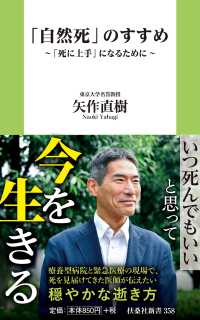Full Description
This book addresses two questions: firstly, how has the fight against COVID-19, especially the individual and collective responses of Latin American nation-states, influenced the relationship between power, people, and statebodies? And secondly, has democracy taken a step back and allowed pandemocracy to replace its long-term legitimising function?
Adopting a Global South perspective, the book explores the constitutional, political and institutional measures that paved the way for several aggressive state policies in various Latin American countries during the COVID-19 pandemic. The contributions provide a detailed review of democratic decay and the 'rule of law' impairment in many countries of the region. The book goes beyond mere observation and explores all the main theoretical elements that can lead to a more comprehensive understanding of the political and normative impact of the pandemic.
In terms of constitutional design and concerning the actual behaviour of political bodies, the fairness and efficacy of Latin American state responses during the COVID-19 pandemic did not rely on civic culture, executive goodwill, or boldness on the part of the judges. The aim of this volume, therefore, is to unravel the most subtle elements of a very puzzling situation.
Multidisciplinary perspectives are deployed to explore how democratic standards and goals have been reshaped by nuanced constructions of certain atavistic normative ideas or even by non-constitutional policies. The book sheds light on the underlying connection between politics and law.
Contents
Part I: The Theory
1. Faltering Institutional Responses in Backsliding Democracies, Pablo Riberi (Universidad Nacional de Córdoba, Argentina)
2. How the Pandemic Changed Democratic Regimes, Sergio Verdugo (IE University Law School, Spain)
Part II: The Practice
3. Pandemocracy in Argentina, Manuel J García-Mansilla (Universidad Austral, Argentina) and Ricardo Ramírez-Calvo (Universidad de San Andrés, Argentina)
4. Pandemocracy in Brazil, Marcelo Figueiredo (Pontifical Catholic University, Brazil)
5. Pandemocracy in Chile, Javier Couso (Universidad Diego Portales, Chile)
6. Pandemocracy in Mexico, José María Serna de la Garza (National Autonomous University of Mexico, Mexico)
7. Peru: Executive v. Legislative Wars Amidst a Global Pandemic, Trilce Valdivia (Universidad
Católica San Pablo, Perú)
8. Venezuela: Effects of the Pandemic in a State Already Lacking Constitutional Democracy and Immersed in a Complex Humanitarian Crisis, Daniela Urosa (Boston College Law School, USA) and José Ignacio Hernández (Catholic University and Central University, Venezuela)
Part III: Beyond States
9. COVID-19, Corruption and Democratic Institutions, Delia M Ferreira Rubio (Córdoba National University, Argentina)
10. Hyper-Presidentialism versus Federalism During the COVID-19 Emergency in Argentina, Brazil, and Mexico, Antonio María Hernández (National University of Cordoba, Argentina)
11. Environmental Democracy under Quarantine? Access to Information and Public Participation During the COVID-19 Pandemic, Maria Florencia Saulino (Universidad de San Andres, Argentina)
12. The Inter-American System and Constitutional Emergencies, Ignacio Colombo Murúa (Universidad Católica de Salta, Argentina)
Epilogue: A Comparative Outlook
13. The COVID-19 Emergency and Instability in Latin America, David Landau (Florida State University, USA)
14. Out of Balance? Revisiting Separation of Powers During the COVID-19 Pandemic, Konrad Lachmayer (Sigmund Freud University, Austria)








